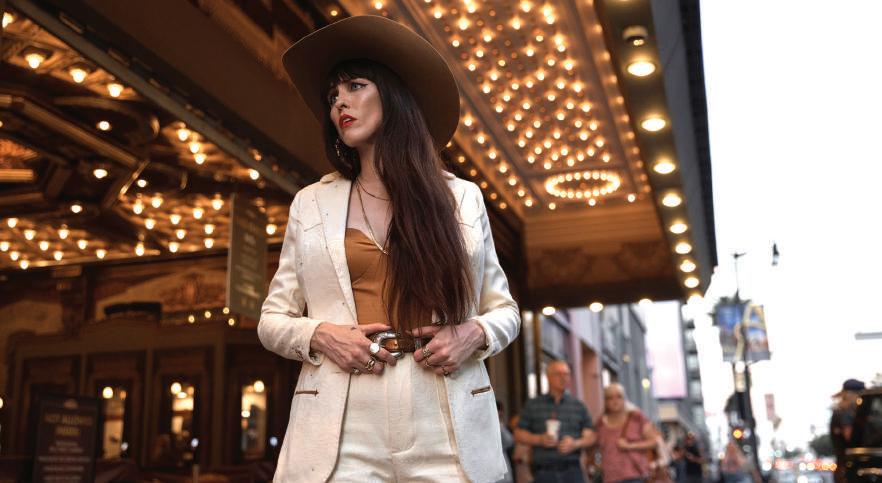
4 minute read
"Neon Glow" An Interview with Jaime
By Gregg Shapiro
Photo By Magdalena Wosinska
Advertisement
One thing’s for certain, Nashville’s not what it used to be. While there have probably always been LGBTQ+ folks in Music City, with each passing year (or maybe even minute), that community is becoming increasingly visible, thanks in part to artists such as the newly out singer/songwriter Jaime Wyatt. A distinguished artist whose hard scrabble life has led to sobriety and embracing her queer identity. She addresses these subjects on her exceptional new album, Neon Cross (New West), and earns her rightful place among the current crop of reigning country divas. Wyatt, who premiered a new music video for her song “Rattlesnake Girl” via GLAAD and Billboard Pride in October 2020, was good enough to answer a few questions about Neon Cross.
Gregg Shapiro: With the exception of “Demon Tied to a Chair in my Brain,” you wrote or co-wrote all of the songs on Neon Cross. What can you tell the readers about your songwriting process and how you think it’s evolved over the years? melodies and phrases and stuff. There was a period when I learned to play guitar that I played to the guitar. But, I got back to my roots and the dreamy quality of writing where I write the melody and the words and the hook in my head, and then bring it to the instrument. Going back to where it originally came from, when I was a child, has been successful for me. I follow the muse rather than making the muse fit inside some sort of box. My life has shown, in every way, that I don’t fit in a box. Why should art? It has form; don’t get me wrong. I’m not necessarily avant garde. I’m not reinventing the wheel. This is country pop. But, I’m happy that I’ve been able to go back to an organic process, especially in sobriety. It was much easier when I was in my 20s just to smoke a joint and [snaps her fingers] get there. Now I’ve worked for it. I have different ways to get there; meditation and a lot of journaling and a lot of reading and learning how to be with myself and go inward.
GS The album features a couple of guest vocalists including Jessi Colter, the mother of producer Shooter Jennings, on “Just A Woman.” Is that how that collaboration came to be?
JW That’s absolutely right. I’ve got this song and I feel like I wrote it for my mother and other people’s moms. I feel like I’m trying to imagine what Tammy Wynette would have said if she could have vocalized some pain in the limitations of being a woman during that time or during this time. I thought, “Who can we have on there?” Then I asked, “Shooter, can we hire your mother?” And he said, “Absolutely!” I’ve met her a few times. She knew who I was and had heard my voice and was happy to do it. It was a huge honor.
GS One of my favorite songs on the album is the wonderful and subtly queer “Rattlesnake Girl.” The song contains the lines, “I see my sweet friends on the weekends, they all look happy and gay, they keep their secrets all covered in sequins.” It made me wonder, what would it mean to you if there was a drag queen somewhere out there getting ready to include a Jaime Wyatt song in her act?
JW Oh, man, if I knew that was happening, I would cry tears of joy. A drag queen getting ready for a performance, which is a holy ritual, that makes everyone feel visible and understood and accepted, I would cry because I think it would be lovely!
GS While things have changed in recent years, being out in Nashville is still something of a challenge. Country music listeners turned their backs on Chely Wright and Ty Herndon after they came out, but in the interim have embraced people from Mary Gauthier to Brandy Clark. Can you please say something about how you see your role as an out country artist? JW That’s a good question. I hope I can articulate this enough because it’s very important to be out and well-studied at country music. Thankfully, I’m surrounded by artists that push the envelope. That’s important because art is supposed to challenge our perspectives. My role being out and being a country singer is important to change the perception of what country music is often associated with. I’ve heard people say that country music is white, racist, and homophobic. I want to change that. I want it to be inclusive. I want to be a part of that movement celebrating country music with everyone! That beautiful American tradition. By the same token, people who have considered it to be only traditional and have used it to exclude LGBTQ+ people, or people of color, or people who didn’t fit in this little box, if they’ve used it for that, they’re sorely mistaken as well. I want to be a voice and a figure to represent the diversity that is American and country music is American. We should all be able to enjoy this.
GS
With live performance on the back burner for the near future, how are you reaching your fans?
JW We, and I say “we” because my label is helping me greatly, are partnering with magazines and music publications to live stream on social media, mainly Instagram and Facebook. We’re also in the process of making a mini documentary about some of the causes I believe in, such as feminism and visibility of the LGBTQ+ community in country music. I’m working on developing a series on current causes, as well as music, and to open up conversations online.

Photo By Magdalena Wosinska










